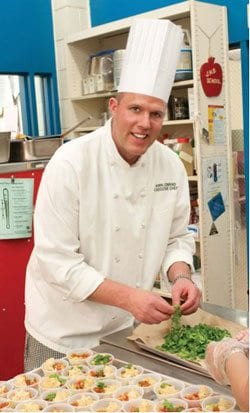
At lunchtime, students from the Boston Arts Academy would leave their classes early and run to the cafeteria. Unlike most high schoolers, they couldn’t wait to eat a school lunch. On Mondays, that is.
On Mondays, their meals were prepared not by “lunch ladies,” but by the former chef of Top of the Hub restaurant in downtown Boston.
Boston Arts Academy was part of “Chefs in Schools,” Project Bread’s initiative to connect low-income children with healthy, high-quality food. To do this, Chef Kirk Conrad, a graduate of The Culinary Institute of America, travels to eight different schools in the greater Boston area to cook breakfast and lunch for students. Working within the budget and resources the schools already have, Conrad creates more nutritious, more appealing meals for kids, a task he says is “really challenging.”
Underlying the Chefs program is the simple premise that food experts should be in charge of school food. “I honestly believe that you have to have the correct people in the correct positions,” Conrad said. School cafeterias are basically restaurants, he explained, and like restaurants, schools need culinary experts.
Chefs in Schools began in 2007 as a partnership between Project Bread, Mayor Thomas Menino, Boston Public Schools (BPS) and the Boston Public Health Commission. In its pilot year, Conrad cooked at the Lila G. Frederick Middle School in Dorchester as well as the Mario Umana Middle School Academy in East Boston.
In its second year, the program expanded to the Curley K-8 School in Jamaica Plain, and later, the Edison K-8 School in Brighton, the King K-8 School in Dorchester, the Higginson/Lewis K-8 School in Roxbury, TechBoston Academy and Boston Arts Academy in Fenway.
Conrad’s meals are cooked from scratch and use fresh fruits and vegetables, whole grains and lean meats, while reducing fat, salt and sugar. His menu features restaurant-worthy dishes like “chicken sandwich on whole-wheat bread with lettuce, tomatoes and pickles, served with sweet potato fries, vegetable soup and blueberries.”
And the program boasts demonstrable results. According to preliminary research conducted by the Harvard School of Public Health, students in the Chefs program eat more vegetables, throw away less uneaten food, and participate more in the school lunch program than students at control schools. Conrad himself notices the change. “When these kids are exposed to fresh foods,” Conrad says, “they really have been accepting of it … [and are] really positive about trying new things.”
Discrediting the conventional wisdom that kids won’t eat healthy food, the Chefs program highlights the potential for real changes in the city’s school lunch program.
According to the Boston Public Health Commission’s “Health of Boston 2010” report, one-third of Boston Public School students are overweight or obese. At the same time, nearly 660,000 people in Massachusetts are at risk for hunger, according to Project Bread. Both conditions — obesity and hunger — are correlated with poverty.
Project Bread, an anti-hunger organization that spans the entire state, also sees Chefs in Schools as an answer to the twin problems of obesity and hunger.
Many students attending Boston Public Schools come from low-income families who struggle to put quality food — if any — on the table each day. But these same students, more than 74 percent of the 56,000 students at BPS, qualify for free or reduced-price school meals. If schools offer the quality, nutritious food that kids may not be getting at home, it can go a long way in staving off childhood hunger and obesity, their logic goes.
But Conrad doesn’t need statistics to understand the extent of childhood hunger in Boston. “I am right there looking at the kids everyday,” he says.
Many students go to him after mealtimes asking for seconds because they are so hungry, he said. Childhood hunger, he believes, is something “we have to take seriously as a community.”
Esteniolla Maitre, a student at Boston Arts Academy, agrees. Maitre grew up in Mattapan, where she said food deserts are abundant. But the 12th-grader doesn’t think there should be food deserts in schools, either. She said that schools help “pick up slack to help families.”
Chef Conrad, she pointed out, “creates miracles” with his food, boosting school lunch participation, inspiring students to be healthier, and preparing dishes kids actually enjoy eating.
For Peter Li, another student at Boston Arts Academy, the Chefs program did exactly this. During his freshman year, Li ate regular school lunches, but he said they were “bland” and “dry” — “it wasn’t appealing.”
The poor quality of the food drove Li to look elsewhere for lunch, and he spent his second year of high school eating chips and soda bought from a nearby CVS. Soon after, Li was suffering from inflammation in his stomach and severe acid reflux. While he can’t explicitly link these health problems to the junk food he was eating, he knows “it had something to do with it,” and decided to get serious about nutrition, and demand his school provide better options in the cafeteria.
After getting Conrad into his school’s cafeteria, Li was finally enjoying healthy food in schools. “The health problems I have wouldn’t have happened,” he said, if he had been eating this kind of food all along. “I don’t want what happened to me to happen to others.”
Although the Chefs program no longer exists at Boston Arts Academy, Maitre said Conrad “motivated kids” to be healthier and to get that quality food, with or without the help of BPS.
And this is exactly the goal Conrad had hoped for.
“I’d really like to see this continue forward and gain momentum,” he said, and for “awareness of school food, health, weight issues to come to the forefront.”






